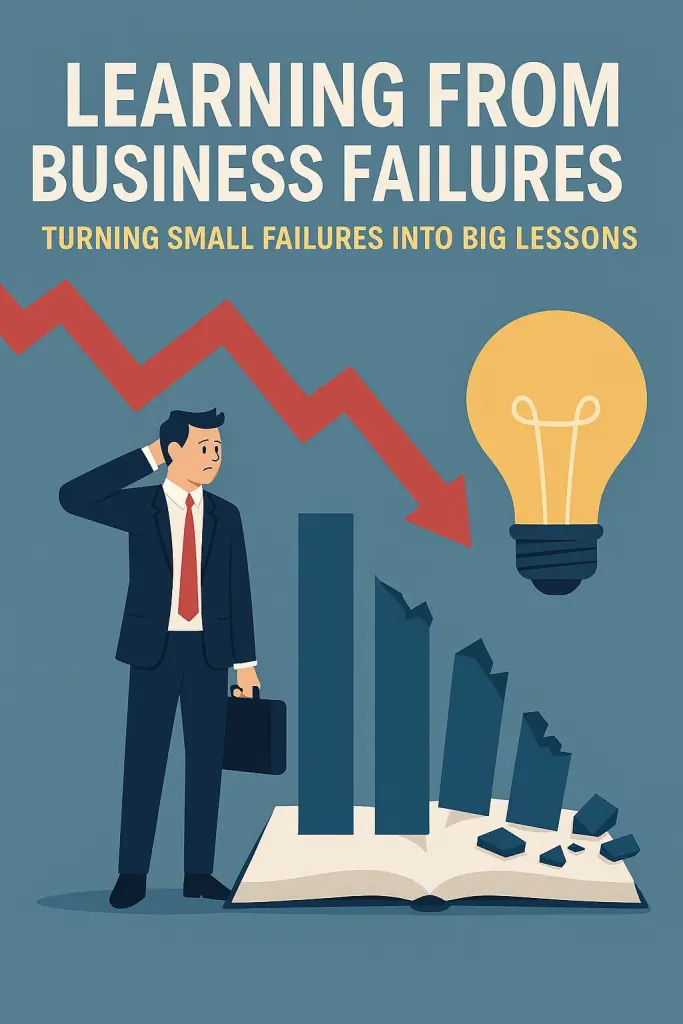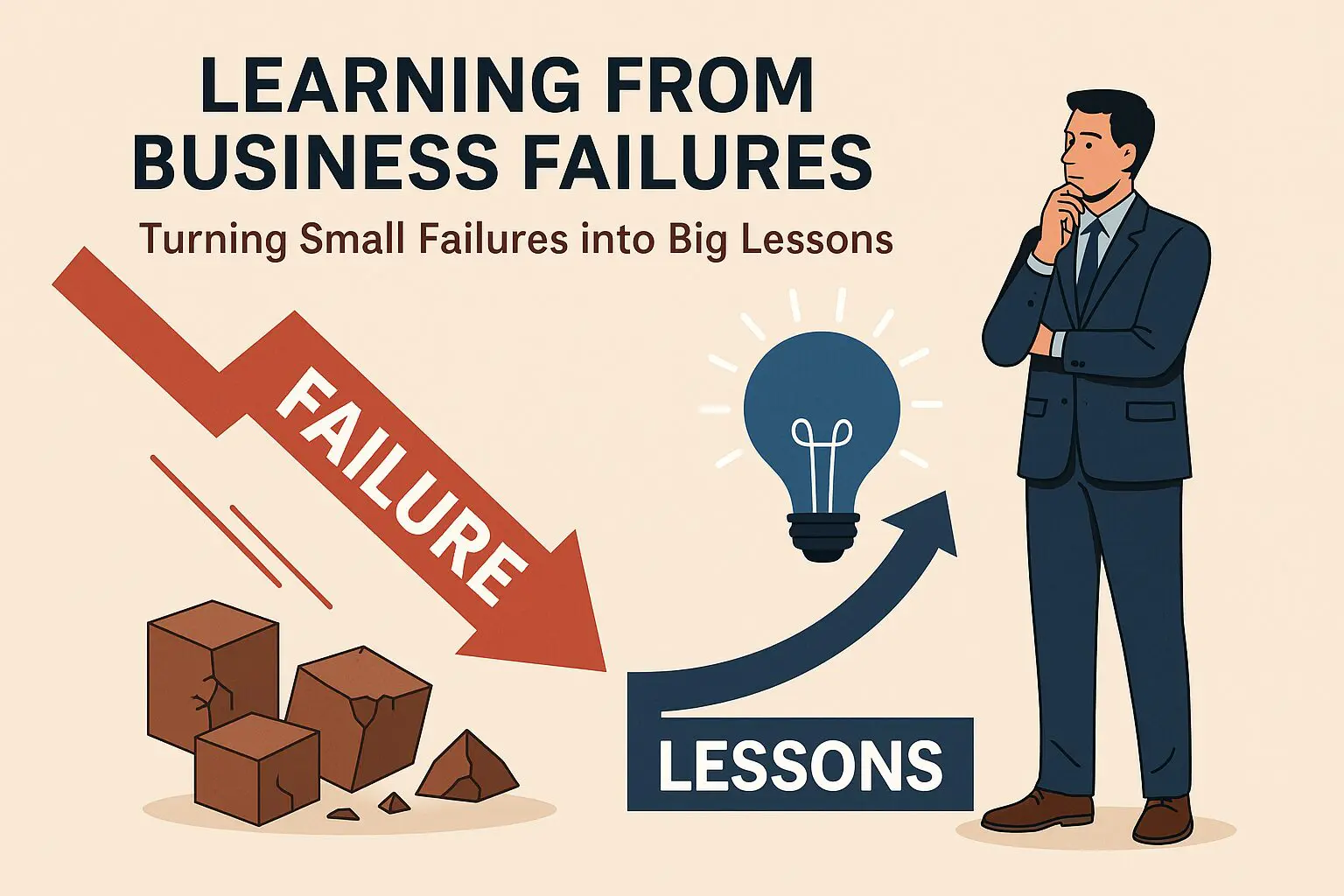Learning from Business Failures: Valuable Lessons for Entrepreneurs
In the challenging world of entrepreneurship, learning from business failures is not just helpful—it’s essential. Failures are a common experience for entrepreneurs, but when handled with the right mindset, they become valuable tools for growth. While setbacks can be painful, they provide critical insights that help business owners refine their strategies and build stronger ventures. In this article, we explore the causes of business failure, the benefits of learning from business failures, and how entrepreneurs can turn setbacks into comebacks.
What Are the Common Causes of Business Failure?
Why Do Startups Fail?
Startups often fail because of inadequate market research, poor financial planning, or premature scaling. Many entrepreneurs launch businesses based on passion without validating their idea through data or customer feedback. A lack of capital, mismanagement, and operational inefficiencies can also lead to failure. Recognizing these root causes is the first step toward learning from business failures and avoiding them in future endeavors.
📚 Resource: CB Insights: Top Reasons Startups Fail
Spotting Early Warning Signs
Entrepreneurs can prevent failure by monitoring key metrics such as cash flow, sales trends, and customer satisfaction. Internal red flags like team conflicts or missed deadlines may also signal deeper issues. Proactively identifying these signs enables business owners to take corrective action before a situation worsens—a critical skill in learning from business failures.
📘 Tip: Use tools like QuickBooks or Wave Accounting to track financial health.
The Importance of Market Research
Accurate market research is one of the most effective ways to prevent failure. It helps entrepreneurs understand customer needs, industry trends, and competition. By aligning offerings with demand, business owners increase their chances of success while learning from past market missteps.
🔍 Tool: Try Statista or SurveyMonkey for data collection and surveys.

How Can Entrepreneurs Learn from Business Failures?
Conducting a Post-Mortem
After a failure, entrepreneurs should conduct a structured analysis to uncover what went wrong. This includes examining data, identifying decision-making gaps, and reviewing team performance. Documenting these findings ensures the lessons aren’t lost and allows others to benefit from the experience—a cornerstone of learning from business failures.
🧠 Resource: Harvard Business Review: Learning from Failure
Reframing Failure as Growth
Failure can be a springboard to success if approached with the right mindset. Entrepreneurs who embrace setbacks as learning experiences are more resilient and adaptive. This positive outlook fosters innovation, builds character, and improves decision-making.
💬 “Failure is simply the opportunity to begin again, this time more intelligently.” – Henry Ford
The Benefits of Reflecting on Failure
Learning from business failures builds problem-solving skills, increases business acumen, and promotes long-term growth. Business owners who analyze their setbacks develop a deeper understanding of their market and are more prepared to adapt to future challenges.
What to Do After a Business Fails
Reflecting with Purpose
Entrepreneurs should engage in honest reflection, asking key questions about what went wrong and how they can improve. Seeking outside perspectives—from mentors, peers, or advisors—can provide new insights and clarity.
🧭 Tool: Use Notion or Trello to organize lessons learned and next steps.
Rebuilding with Resilience
When restarting or pivoting a failed business, entrepreneurs should focus on refining their value proposition, securing adequate resources, and building a team aligned with their vision. Transparency with stakeholders about past lessons and future strategies can rebuild trust and confidence.
Staying Motivated After Setbacks
Maintaining confidence after a failure requires focus and intentional action. Entrepreneurs can stay motivated by setting achievable goals, celebrating small wins, and surrounding themselves with a strong support system. These habits promote perseverance and reinforce the benefits of learning from business failures.
💡 Support: Join communities like SCORE Mentors or Indie Hackers for peer support.
How Successful Entrepreneurs Turn Setbacks into Strength
Adopting a Growth Mindset
Entrepreneurs with a growth mindset view failure as a stepping stone. This perspective encourages calculated risk-taking, adaptability, and continuous improvement. Embracing this mindset is vital for learning from business failures and achieving long-term success.
🎧 Listen: Carol Dweck on Growth Mindset – Podcast
Leveraging Partnerships and Networks
Strategic relationships offer support, resources, and opportunities during difficult times. Mentorship, industry networks, and peer communities can provide advice and open doors for recovery. These relationships are often formed and strengthened through the shared experience of overcoming failure.
Learning from Real-Life Comebacks
Many iconic entrepreneurs have bounced back stronger after failure. Steve Jobs, Walt Disney, and Oprah Winfrey all experienced major setbacks before achieving monumental success. Their stories show that learning from business failures is often the catalyst for breakthrough innovation.
Why Learning from Business Failures Matters
Personal and Professional Growth
Failure tests character and sharpens business instincts. Entrepreneurs who embrace it develop resilience, adaptability, and greater self-awareness. These attributes are invaluable on the road to business success.
Driving Innovation Through Failure
Innovation thrives in an environment where failure is accepted as part of the process. Entrepreneurs who aren’t afraid to fail are more likely to explore bold ideas and create disruptive solutions. Learning from business failures fosters the kind of risk-taking necessary for real innovation.
Cultivating a Resilient Spirit
Resilience is what keeps entrepreneurs moving forward after a setback. Developing it involves mindset work, goal-setting, and support systems. The more you practice bouncing back, the easier it becomes—and the more you grow by learning from business failures.
Conclusion
Business failure is never easy, but it can be an incredible teacher. Entrepreneurs who learn from business failures gain powerful insights that help them build smarter, stronger companies. Whether you’re reflecting on a recent setback or preparing for your next venture, remember this: failure isn’t the end—it’s just part of the journey to success. Embrace it, learn from it, and let it guide you to greater things.
Q: How can small business owners learn from failure?
A: Small business owners can learn from failure by analyzing what went wrong and identifying the lessons learned. Understanding that failure is inevitable in any venture and using it as an opportunity for growth can transform setbacks into valuable insights.
Q: Why is it important to embrace failure in an entrepreneurial venture?
A: Embracing failure in an entrepreneurial venture is important because it helps diminish the fear of failure, fostering an environment where innovation and risk-taking can thrive. Failure teaches resilience and adaptability, essential traits for any business leader.
Q: What are some lessons learned from business failures?
A: Some lessons learned from business failures include understanding market needs better, improving financial management, and enhancing customer relations. These lessons can guide future strategies and prevent similar mistakes.
Q: How can a partner center support learning from your failures?
A: A partner center can support learning from your failures by providing a network of experienced mentors and peers who can offer advice and share their own experiences. This support system can help you gain different perspectives and develop context-specific strategies to overcome challenges.
Q: What role does “failure isn’t always” a bad thing play in business growth?
A: Recognizing that failure isn’t always a bad thing plays a crucial role in business growth. It encourages experimentation and innovation, allowing businesses to learn and adapt time after time. This mindset transforms failure into a stepping stone rather than a setback.
Q: How can small business owners overcome the blame game when things don’t go as planned?
A: Small business owners can overcome the blame game by focusing on solutions rather than assigning fault. Encouraging open communication and fostering a culture where failure is something to learn from, not to be feared, helps maintain a positive and forward-thinking work environment.
Q: What should entrepreneurs do when failures occur quickly in a new venture?
A: When failures occur quickly in a new venture, entrepreneurs should assess the situation promptly, draw insights, and pivot if necessary. Quick failures can provide critical feedback that, when acted upon, can lead to more informed decision-making and better strategies.
Q: How does the fear of failure get in the way of business success?
A: The fear of failure gets in the way of business success by causing hesitation, stifling creativity, and preventing entrepreneurs from taking necessary risks. Overcoming this fear is crucial for fostering an entrepreneurial mindset that views failure as a part of the learning process.
Q: Can a newsletter help business leaders learn from their failures?
A: Yes, a newsletter can help business leaders learn from their failures by sharing stories of setbacks and successes. It serves as a platform for exchanging insights and strategies, reinforcing the idea that every business experiences failure at some point, and learning is a continuous process.





